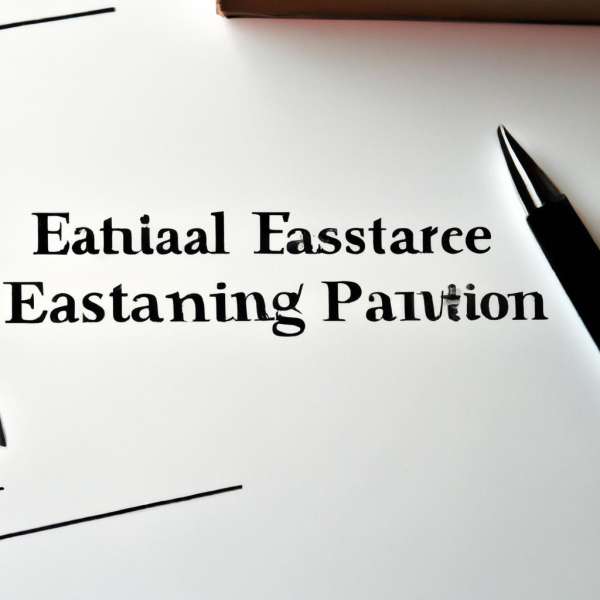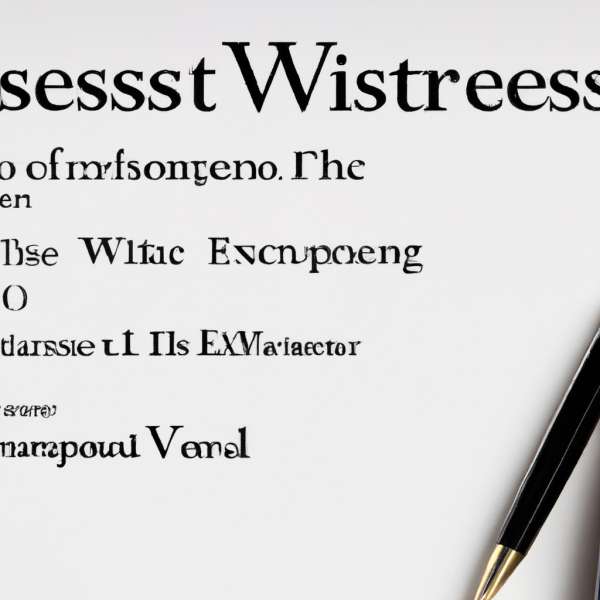In the intricate tapestry of life, certain threads often go unnoticed until we find ourselves faced with the inevitable: our mortal journey. Among the many threads that weave our existence together lies one of profound significance—the will. Imagine navigating a labyrinth without a map, uncertain of the paths that lead to peace or conflict, harmony or chaos. This is the reality that many face when they leave behind no clear directives. A will is more than a legal document; it is a roadmap for our loved ones, a final voice in our own narrative, ensuring that our wishes are honored and our legacies preserved. In this article, we will explore the importance of having a will, unraveling the benefits it holds not just for the individual, but also for the families and friends left to carry forward their story. Join us as we delve into the essence of planning for the future, illustrating how a simple act of preparation can create a lasting impact.
Understanding the Foundation of Estate Planning
Creating a solid estate plan is akin to constructing a sturdy house: it requires a strong foundation. At the heart of this planning lies the will, a crucial document that dictates how your assets and belongings will be distributed upon your passing. A well-thought-out will serves not only to clarify your wishes but also to minimize conflicts and confusion among loved ones during a difficult time.
When drafting a will, consider the following essential components:
- Executor Designation: Appoint a reliable person to carry out your wishes, ensuring your estate is administered smoothly.
- Asset Inventory: Provide a detailed list of your possessions, from real estate to personal belongings, so that your intentions are clear.
- Beneficiary Assignments: Specify who will inherit your assets, removing ambiguity and potential disputes.
- Guardianship Provisions: If you have minor children, designate guardians to ensure their care and support.
To shed light on the differing elements that can shape your will’s impact, refer to the table below, which outlines key considerations:
| Aspect | Importance | Potential Consequences |
|---|---|---|
| Clear Language | Eliminates misunderstandings | Disputes among heirs |
| Regular Updates | Reflects life changes | Outdated directives |
| Legal Compliance | Avoids legal challenges | Invalid will |
| Communication | Fosters family harmony | Secrets and misunderstandings |
Taking the time to understand these foundational elements ensures that your estate plan is not just a legal formality but a meaningful reflection of your values and desires. A comprehensive will can act as a guiding compass for your loved ones, leading them through the complexities that may arise after your departure.

Key Benefits of Drafting a Will for Your Loved Ones
Drafting a will is an invaluable step in ensuring that your loved ones are taken care of after your passing. By outlining your wishes clearly, you eliminate unnecessary confusion and conflict among family members. **A clear directive not only preserves relationships, but it also streamlines the process of settling your estate.** Without a will, your assets may be distributed according to state laws, which may not align with your personal desires.
Another significant benefit of having a will is the opportunity to designate guardianship for your minor children. This decision holds profound implications for their upbringing and well-being. By expressing your preferences for guardianship, you ensure that your children will be cared for by individuals who align with your values and principles. **This vital aspect offers peace of mind for parents and creates a safety net for the future.** Additionally, you can specify any additional provisions, such as education funds or special care requirements, to further safeguard your children’s future.
Furthermore, a well-structured will can allow you to leave *specific gifts* or support to your loved ones. This can include monetary gifts, family heirlooms, or cherished possessions that hold sentimental value. You might consider outlining your intentions in a simple table format for clarity:
| Item | Beneficiary | Special Notes |
|---|---|---|
| Family Heirloom Necklace | Daughter | Passed down for generations |
| $10,000 Savings Account | Son | For college expenses |
| Pet Care Fund | Close Friend | To cover expenses for the pet |
Lastly, by creating a will, you have the opportunity to address any outstanding debts and make decisions regarding your funeral arrangements. This can alleviate the burden on your family and provide them with a clear pathway for honoring your wishes. **Setting forth these details in advance fosters a sense of control and respect over your legacy, ensuring your loved ones can navigate the challenges of your passing with clarity and compassion.**

Navigating Common Misconceptions About Wills
When it comes to estate planning, many people fall prey to misconceptions that can lead to avoiding or delaying the creation of a will. One prevalent myth is that only the wealthy need to have a will. In reality, **everyone** can benefit from having a will, regardless of their financial situation. A will serves to clarify your wishes, ensuring that your assets are distributed according to your desires and providing peace of mind for your loved ones.
Another common misunderstanding is the belief that drafting a will is overwhelmingly complicated and requires a lawyer. While legal guidance can be beneficial, especially for complex estates, there are user-friendly resources available today, including online will-making platforms. Moreover, **basic wills** can often be drafted with minimal effort, allowing individuals to express their intentions without the stress of legal jargon.
| Misconception | Truth |
|---|---|
| Only the rich need a will | Everyone should have a will |
| Wills are too complicated | They can be simple to create |
| Probate is always lengthy and costly | A will can streamline the process |
Lastly, many individuals believe that **having a will** is sufficient to avoid probate, the legal process through which the will is validated and assets are distributed. While a will is essential, it does not necessarily bypass probate entirely. Different assets, such as those held in joint tenancy or through living trusts, can offer alternatives to simplify or avoid the probate process, making it crucial to understand the complete estate planning picture.

Essential Steps to Create an Effective Will
Creating a will is more than just a legal formality; it’s a powerful way to express your final wishes and provide for your loved ones. To ensure your will serves its purpose effectively, consider these essential steps:
- Reflect on Your Wishes: Take time to contemplate how you wish to distribute your assets and the guardianship of any minor children.
- Choose an Executor: Select a trustworthy person who will ensure that your wishes are fulfilled and will manage your estate’s affairs.
- List Your Assets: Create a comprehensive list of your assets, including property, bank accounts, investments, and sentimental items.
- Consult a Legal Professional: Although DIY wills are available, seeking advice from an estate attorney can help you navigate complex laws and ensure that your will is valid.
- Consider Digital Assets: Don’t forget to address your online presence and digital accounts, ensuring they are managed according to your wishes.
Once you have gathered your thoughts and materials, document your will in writing. Depending on your jurisdiction, you may need to follow specific formatting rules:
| Requirement | Description |
|---|---|
| Signatures | Most states require you to sign the will in the presence of witnesses. |
| Witnesses | Typically, 2 to 3 witnesses who are not beneficiaries should sign the will. |
| Notarization | Consider having your will notarized for added legal weight, even if it’s not required. |
remember that a will is not a static document. As your life changes—whether due to the birth of a child, a change in marital status, or significant financial shifts—revisit and update your will accordingly to ensure it always reflects your current wishes and circumstances.
Wrapping Up
crafting a will is not merely a legal formality but a profound act of stewardship and care for those we leave behind. It provides clarity amidst uncertainty, ensuring that your wishes are honored and that your loved ones are shielded from potential disputes and confusion. Beyond legal jargon, a will is a testament to love—a final gift that reflects our values, priorities, and hopes for the future. As you consider your own legacy, take the time to reflect on what truly matters. Investing in a will today paves the way for peace of mind tomorrow, allowing you to focus on living fully and sharing your journey with those who matter most. Remember, it’s never too early to start planning; after all, every chapter of life deserves a thoughtful conclusion.


